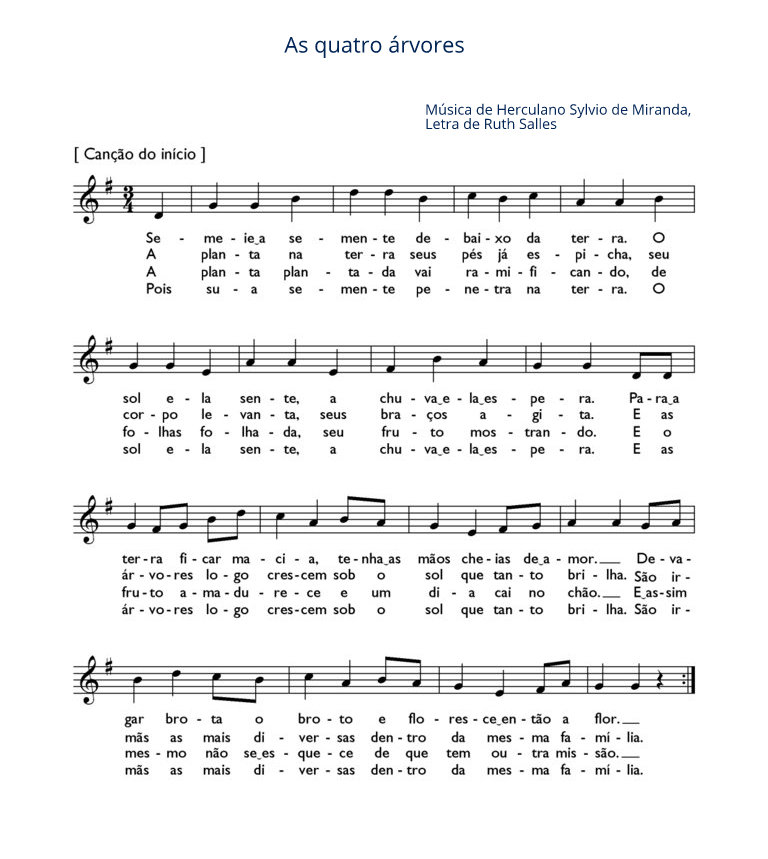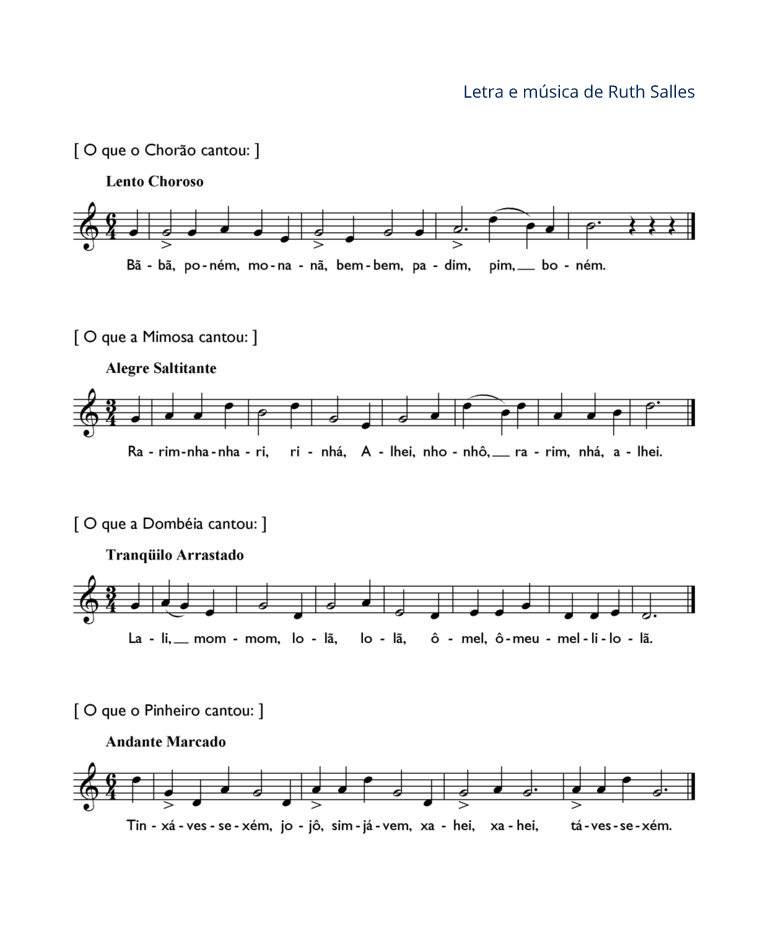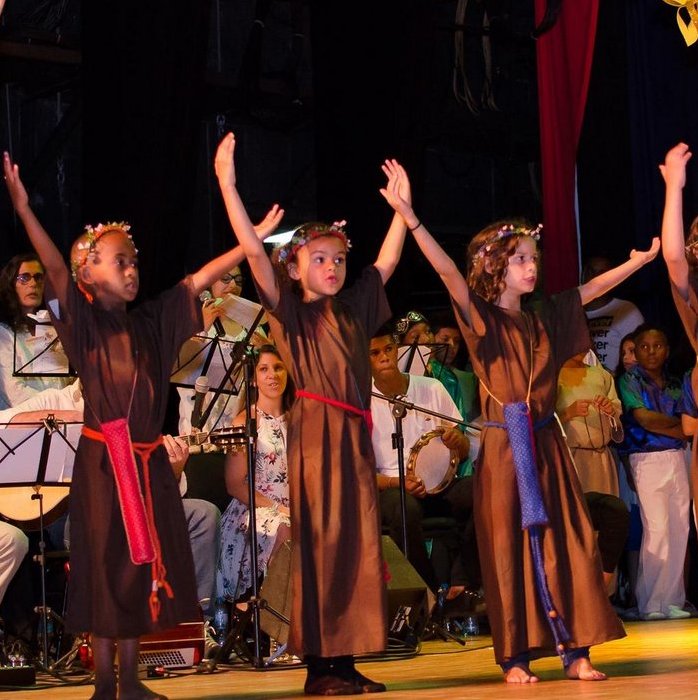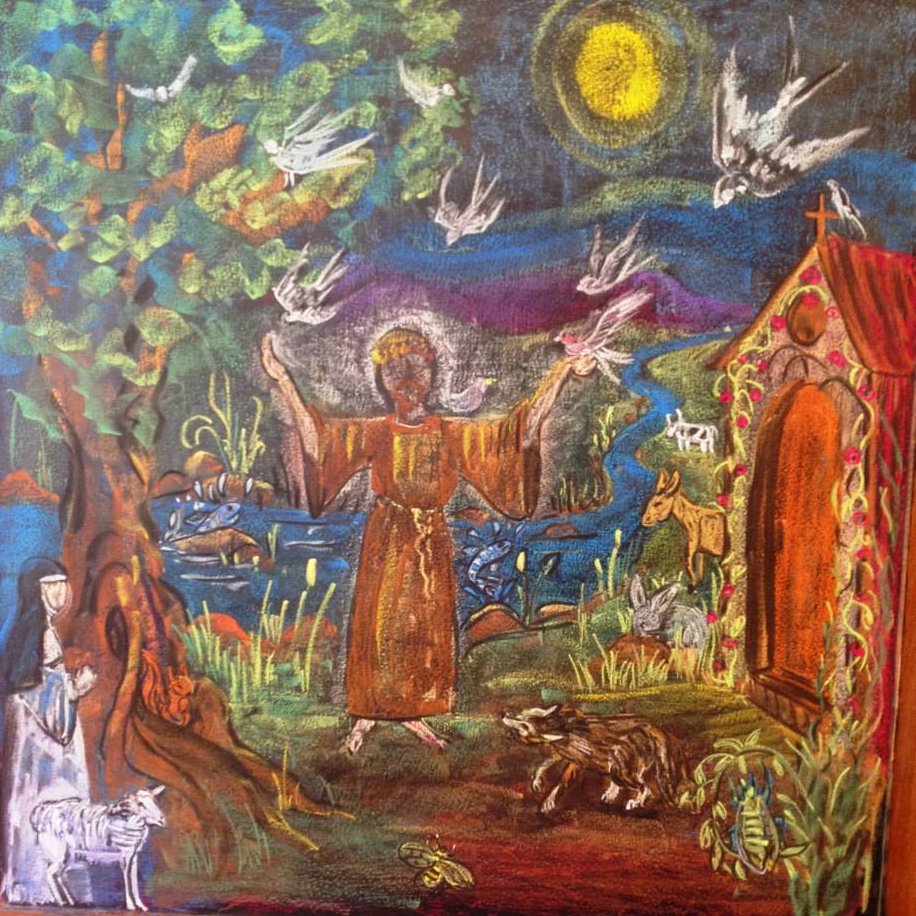play by Ruth Salles
In this piece, trees represent the four temperaments. The role of each tree is played by a group of children.
CHARACTERS:
Choir
Girls
Sun
Rain
Whiners (melancholic temperament)
Mimosas (blood temperament)
Dombeias (phlegmatic temperament)
Pines (choleric temperament)
The trees are down as the choir sings and the sun and rain pass. Little by little, they get up, placing their feet on the ground and waving their arms upwards, until the song of the seeds ends. You can even try a kind of tree dance.
CHORUS (sings):
“Sow the seed
underground.
The sun she feels,
the rain she waits for.
For the earth to be soft,
have your hands full of love.
Slowly sprouts the bud
and then the flower blooms.
The plant, on the ground,
your feet already stretch,
your body lifts,
your arms wave.
And the trees soon grow
under the sun that shines so brightly,
they are the most diverse sisters
within the same family.
the plant planted
goes branching,
leafy leaves,
its fruit showing.
And the fruit ripens
and one day it falls to the ground.
And still don't forget
that you have another mission.
for your seed
penetrates the earth.
The sun she feels,
the rain she waits for.
And the trees soon grow
under the sun that shines so brightly.
They are the most diverse sisters
within the same family.”
GIRLS (point to trees):
– Four friendly trees,
rustling through the air,
to sing your songs
your story comes to tell.
The Whining, hanging, spies
the Mimosa swinging.
dombeia begins
to give honey and to take a nap.
The pine sharpens the needle
and rises high and attentive
to fight with the air and the wind.
CHORUS (speaks loudly):
– Here on this wheel
who speaks first?
Cry or Mimosa?
Dombeia or Pine?
WORRIERS (waving arms down):
- What noise! Keep silent!
In the quiet night I hide,
when there are quiet stars,
and the moon comes to cover my shoulders
with your silver blanket.
It makes me feel so sad…
Also in the cloudy afternoon
I say like this: “Rainy cloud,
send a long rain,
send a tearful tear!”
I'm Cry. I wanna cry…
If a child is sad,
I think like this: “So there is
someone like me, like Cry?”
And I tell her, “Come here!
I'm your friend! His brother!" (they wave their arms again and stay still)
MIMOSAS (waving their arms up and protesting):
– I don't like it, no!
I like laughter,
I like is the song
the children sing.
I dress in gold!
I am clear and luminous,
because I am Mimosa.
Rain is what I don't like.
Break my flower.
And in the wind well disposed
I say, “Please!
Want to come dance with me?”
And the wind is my friend.
blowing with love,
shake and dry the flower.
At night, how tired...
shining stars,
rock me in your arms,
and I stay to rest… (they do a crib rocking and settle down.)
DOMBEIAS (arms on waist and legs slightly open):
– I am Dombeia.
I am wide and bushy.
full of branches,
I'm very calm.
summer brought me
many bees.
I gave them sweet honey
of my little flowers.
And the bee rests
in pink flower.
I like child,
of elderly person.
If the summer is hot,
come people and cuddle
in the cool shade
that I leave on the floor.
my winged perfume
makes you dream,
and the wind stopped
takes a nap. (they lay their heads sideways in their hands and shut up)
PINE:
- I'm Pine.
spiked cup,
I'm companion
of the kids.
“Hey, bullies,
I'm your friend!
beautiful pine nuts
I bring with me.
You know I face
the strong wind
from the storm?
That is true!
Here comes the wind!
come fly,
blow on people!
But I'm brave!
I skewer the air
and beat the wind!
You are afraid?
Come, boy!
my secret,
my courage
I'll teach soon!"
GIRLS:
— And the trees, rustling,
in very friendly conversation,
they didn't even see me passing
and I heard the whole song...
That's how we learn,
and I can repeat.
But I sing and no one understands.
Did I not know how to listen?
(The trees sing along with the girls and the choir.)
CRY:
“Bã-bã, poném, monanã, well-well,
padim, pim, boném.”
MIMOSA:
“Rarim-nha-nha-ri, rinhá, alhei,
nhonho, rarim, nah, alhei.”
DOMBEA:
“La-li, mom-mom, lola, lola,
oh-ho-ho-my-honey-li-lo-wool.”
PINE:
“Tinxa-vessexém, jojo, yes-already-coming,
xa-hei, xa-hei, ta-vessém.”


End





